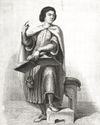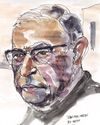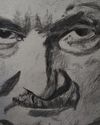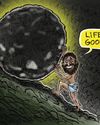
What is Hegel’s view of freedom?
His ideas about freedom have to do with four different questions. First, what is freedom? Second, what is its role in history? Third, how important is it? Fourth, what does it take to actually be free?
To take up the first issue: Freedom has three components. To be free is to be at one with oneself – what Hegel calls in German Beisichsein. One is at one with oneself when self-consciously acting out of a law that’s part of one’s own nature – acting according to ideas and principles of one’s own, not principles arbitrarily imposed from without.
This aspect of freedom involves being independent, but independence is often mistakenly identified with freedom itself, instead of being recognized as merely a component of freedom. Genuine freedom for Hegel involves not only independence, but also a kind of structured dependence on others. All three of these components – being at one with oneself, independence, and structured dependence – have to be in play for there to be full freedom instead of partial or even self-undermining freedom.
Esta historia es de la edición December 2023 / January 2024 de Philosophy Now.
Comience su prueba gratuita de Magzter GOLD de 7 días para acceder a miles de historias premium seleccionadas y a más de 8500 revistas y periódicos.
Ya eres suscriptor ? Conectar
Esta historia es de la edición December 2023 / January 2024 de Philosophy Now.
Comience su prueba gratuita de Magzter GOLD de 7 días para acceder a miles de historias premium seleccionadas y a más de 8500 revistas y periódicos.
Ya eres suscriptor? Conectar

The Two Dennises
Hannah Mortimer observes a close encounter of the same kind.

Heraclitus (c.500 BC)
Harry Keith lets flow a stream of ideas about permanence and change.

Does the Cosmos Have a Purpose?
Raymond Tallis argues intently against universal intention.

Is Driving Fossil-Fuelled Cars Immoral?
Rufus Duits asks when we can justify driving our carbon contributors.

Abelard & Carneades Yes & No
Frank Breslin says 'yes and no' to presenting both sides of an argument.

Frankl & Sartre in Search of Meaning
Georgia Arkell compares logotherapy and atheistic existentialism.

Luce Irigaray
Luce Irigaray, now ninety-two years old, was, among many other things, one of the most impactful feminists of the 1970s liberation movements - before she was marginalised, then ostracised, from the francophone intellectual sphere.

Significance
Ruben David Azevedo tells us why, in a limitless universe, we’re not insignificant.

The Present Is Not All There Is To Happiness
Rob Glacier says don’t just live in the now.

Philosophers Exploring The Good Life
Jim Mepham quests with philosophers to discover what makes a life good.